A Recommitment to the Peace Testimony
Friends have been distracted from our peace testimony in recent years due to the importance of addressing climate change and racism. Developments in Ukraine have forced us to once again examine a part of our tradition that many of us find difficult to understand.
We are familiar with the words of early Friends in their 1660 Declaration to Charles II:
We utterly deny all outward wars and strife and fightings with outward weapons, for any end, or under any pretense whatsoever; and this is our testimony to the whole world.
Do these words make sense to us? There are Friends who accept this testimony as an article of blind faith; others reject it out of hand. The only other option is to struggle with it. We all have different leanings and different leadings, and it falls to each of us to make sense of this basic aspect of Quaker faith and practice for ourselves. I here share my own journey in the hope that others will travel their own paths.
As I entered into the Quaker community during the war in Vietnam, I came to know people who attended peace demonstrations and offered draft counseling to young men. Eventually I saw our leaders end the war, and surely the crowds in the streets contributed to that decision.
Early Learning
When I first encountered Friends 50-some years ago, my reaction to the peace testimony was that it was naïve. Sure, I didn’t like war. Who does? But the Hitlers of the world have to be stopped. Over time, I have come to believe that it is naïve to think that complex social, cultural, and economic conflicts can be solved with bombs.
Furthermore, the resentment felt by losers can last a very long time, compromising the quality of the peace achieved by violence. That said, I would be the last person to say that these situations are simple. I am not prepared to say that military force is never required.
By the time of my introduction to Quakerism, I had already been deeply moved by the use of nonviolence in the Civil Rights Movement. I had seen that nonviolence is action, not passivity, as some people thought, and it is highly strategic. Martin Luther King Jr. was very savvy in the actions he chose, well aware, for example, of the power of television to get his message into U.S. homes. At the same time, nonviolence is deeply spiritual; its goal is the blessed community. I had been amazed by the discipline and spiritual power King’s followers showed in standing up to fire hoses and dogs. And of course, I saw how the power of the movement ultimately led to important national legislation.
Now, as I entered into the Quaker community during the war in Vietnam, I came to know people who attended peace demonstrations and offered draft counseling to young men. Eventually I saw our leaders end the war, and surely the crowds in the streets contributed to that decision.
I learned more about nonviolence over the years. Just as people die in wars, they may die practicing nonviolence. I learned about Mohandas Gandhi’s movement, which led to India’s independence from Great Britain. I read about Norwegian teachers’ united refusal to teach Nazi propaganda during World War II in spite of serious threats.
I learned some techniques: about mediation, about the importance of listening, and that showing adversaries respect sometimes allows them to compromise or even back down while saving face. I also saw that it is often unrealistic to seek nonviolent solutions in the midst of crisis; preparation and training are necessary, and the sooner resentments are faced, the more likely it is that violence can be avoided. Finally, I saw that nonviolent solutions are often creative and unexpected, even humorous. They arise organically from people who have prepared themselves spiritually.
I met people pursuing advanced degrees in peace studies, and I became aware that this body of knowledge was unknown to most of the people making major decisions about war and peace for the United States.
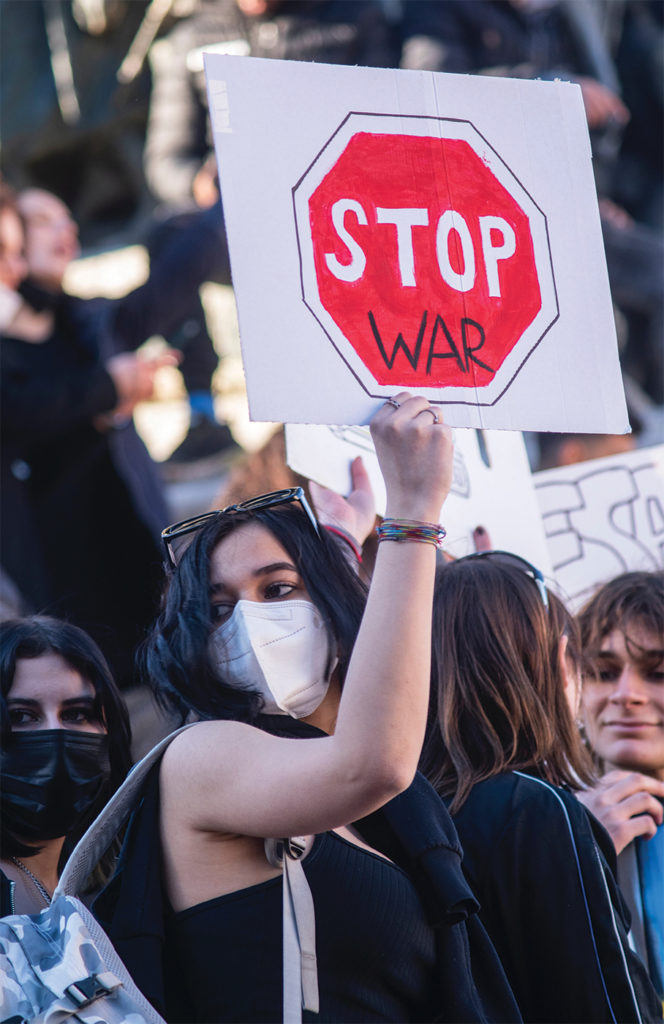
Photo by Edoardo Ceriani on Unsplash
The False Reality
A ruler standing in water and viewed from the side appears to be bent. There have been times when I actually removed a ruler from water to convince myself it was straight. There are aspects of the dominant culture that are like that. I call it the false reality: false because it contains ideas that are counter to my understanding of Truth, but reality because it forces itself on us as the way things are.
Here’s an example: we are told that to be safe as a nation, we need a strong military, even at the expense of the well-being of our people. Some of us are told we won’t be safe if we don’t have a gun in the house. Theologian Walter Wink in The Powers That Be talks about the myth of redemptive violence:
The myth that violence “saves” is so successful because it doesn’t seem to be mythic in the least. Violence simply appears to be the nature of things. It’s what works. It seems inevitable, the last and, often, the first resort in conflicts.
I think of two old movies readers may be familiar with: 1952’s High Noon, a Western starring Gary Cooper, and 1985’s thriller Witness, starring Harrison Ford and Kelly McGinnis. Both feature characters committed to peace: in one case, a Quaker woman and in the other, an Amish community. In each, someone is harassing the community. The respective heroes patronize the pacifists for a while, but eventually they can’t take it anymore, and with an act of violence, they put down the perpetrators. At this point, the audience is elated. The good guys won.
The myth of redemptive violence tells us that war is honorable and our warriors are heroes. These ideas are reinforced by common understandings of civic virtue. Being a loyal American means supporting our troops, we are told, which is taken to mean supporting what they are doing. So even if a 17-year-old joins the military because of a lack of employment opportunities and then gets killed in a battle, how can we not call them a hero? Otherwise, they died in vain; this would be too painful to accept. Who wouldn’t feel guilty if they didn’t honor these fallen heroes? Thus, the false reality gets hold of us.
The false reality tells us that U.S. lives matter more than others’ lives. It tells us that White American lives matter more than Black American lives, that White European refugees matter more, and deserve more airtime and more assistance, than do People of Color fleeing from Yemen or Ethiopia.
The false reality gets hold of our emotions as well as our beliefs. I remember two times that I experienced shame because I was questioning the rightness of military action. Once was in the year after 9/11. I had given a lot of energy to thinking about ways to respond that didn’t involve starting a war, and I had written many letters to President Bush, my senators, and my congressman. Then one day, I suddenly felt overwhelmed by a feeling of shame. Was I being disloyal, or even un-American? It took me a while to work my way through this: to remember that criticizing my country can be patriotic. More recently, as I tried to think of peaceful responses to Putin’s invasion of Ukraine, I suddenly again felt shame but this time because I was being naïve. How can a little old Quaker lady question all those strong men who know best? I managed to remember that I am, in fact, an intelligent and knowledgeable woman whose opinion should be taken seriously. But it took some work. We have to be prepared to be brought low with feelings of being wrong and wicked or naïve and find the strength to stand up to the powerful false reality. Do not underestimate the power of these ideas.
Function of Meetings
It is a common understanding that nonviolent peacemaking begins with internal peace. To gain and keep that peace, “which passeth all understanding,” as Paul put it in his epistle to the Philippians (4:7 KJV), we need spiritual community. Most importantly, our meetings help us find our spiritual center in worship. Inner peace is a lifetime quest; we don’t get there once and for all, but we get closer as we open ourselves, in a community of love and on a regular basis, to the Holy Spirit.
It is our Quaker faith that tells us there is that of God in every person, and therefore, war is wrong. This shared belief impels us to learn together about peaceful options. Furthermore, within the meeting, we can practice answering that of God in one another. We strive to be the beloved community.
The other great spiritual source is, of course, the teachings of Jesus, especially the Sermon on the Mount. Let us keep returning to this source of inspiration. Together, the teachings of Jesus and writings of Friends give us the North Star that will guide us.
With good spiritual grounding, we can point out to one another the falseness of the false reality. Together we can help one another see what is real and feel secure in its rightness. As we share our thoughts outside that powerful corrupting force, we have the comfort of knowing we are not alone.
People need to feel safe: whether in their homes, their communities, or their nations. If they don’t understand nonviolence, they of course turn to military response, police action, and gun ownership to make them feel safe. We know that nonviolence can be a powerful force, but we need to spread the word. Let our meetings be centers of nonviolence education not only for ourselves but for our larger communities.
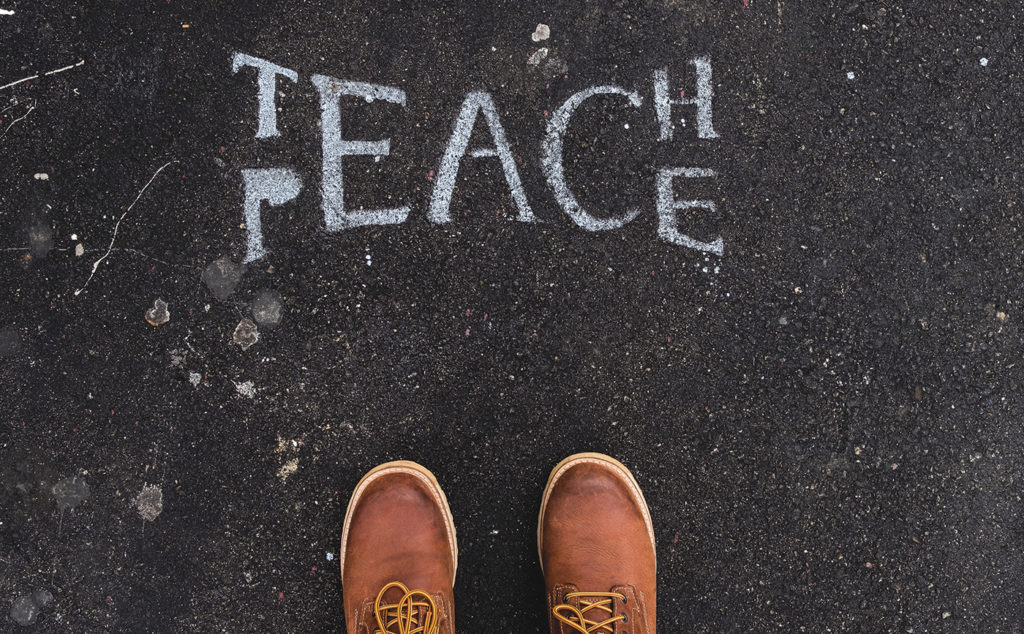
Photo by Daniel Salcius on Unsplash
Reasons for Optimism
There are reasons for optimism. The dominant culture has embraced anti-bullying and conflict resolution training in schools, and many Friends have received Alternatives to Violence Project training and, in some cases, gone on to teach it in prisons and other venues. Our annual observance of Martin Luther King Jr.’s birthday brings us the reminder of what mass peaceful resistance can accomplish. Many people are trying to figure out how some of the tasks assigned to police could better be accomplished by other means. And many communities have a public service that offers mediation. On the personal level, it has become less stigmatized for couples to seek help to work out their differences in peaceful ways. At the international level, we have become accustomed to boycotts and sanctions to put pressure on nations that trespass international standards. While the United Nations is often dysfunctional in settling disputes because of the veto power of the five permanent members, international programs such as the International Atomic Energy Agency and the UN’s World Food Program address the causes of war.
I will expect it to be hard to think outside of the false reality. It will require spiritual centeredness, hard thinking, and spiritual community.
My Personal Commitment
Finally, it behooves each of us to develop a personal statement of our relationship with our peace testimony. The statement will change over time, and as it does, we will be wiser. We won’t always be faithful to our commitment, but we will try. Here is my current statement.
Whatever autocratic leaders do, whatever conflict we face, I will not give up on nonviolent solutions. In The Powers That Be, Walter Wink writes:
The problem with war or violence as a last resort is that we may be less likely to look to God for a way through if we have already settled in advance that violence is an option. . . . Those who have not committed themselves to nonviolence in advance and under all circumstances are less likely to discover the creative nonviolent option in the desperate urgency of a crisis.
I am not convinced that war is never justified, but I know I can count on others to make that decision. As a Friend, I will keep looking for nonviolent options and communicating them to anyone who will listen.
I will attempt to see conflicts as problems to be solved rather than enemies to be defeated. I will look for conflicting needs that might give way to creative solutions. I will not define anyone as an enemy, and I’ll eschew terms like “evil empire” or “axis of evil.”
I will expect it to be hard to think outside of the false reality. It will require spiritual centeredness, hard thinking, and spiritual community. I’ll keep at it.
I will listen to people with different ideas, remembering how tempting it is to talk rather than listen.
I will attempt to keep up on current affairs, but I will limit my exposure to the media. Most sources of information are affected by aspects of the false reality. I will try to keep my eye on the guidance of Spirit, and I will balance exposure to media with exposure to Quaker teachings and the teachings of Jesus.
And I will speak truth to power.
What is your commitment?


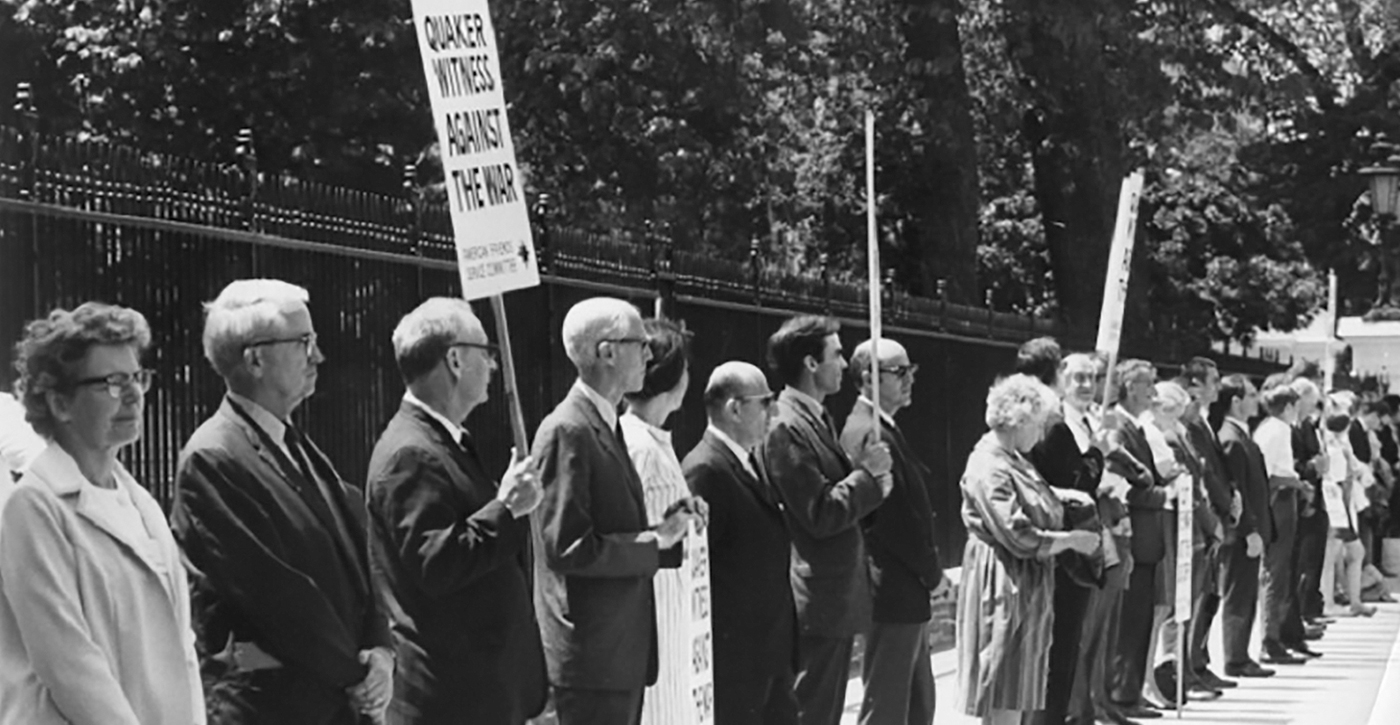
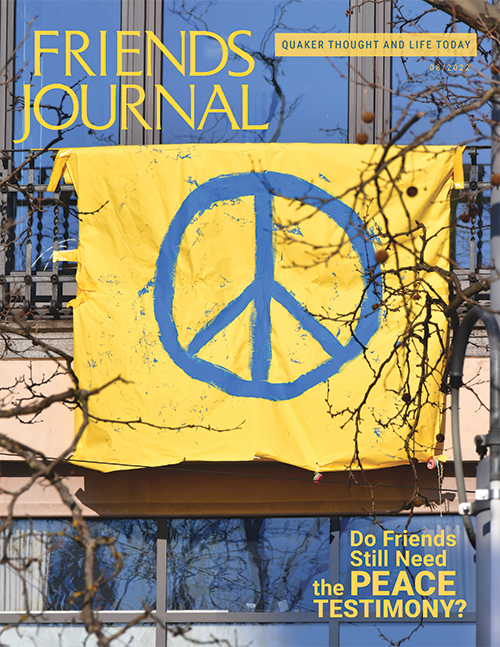
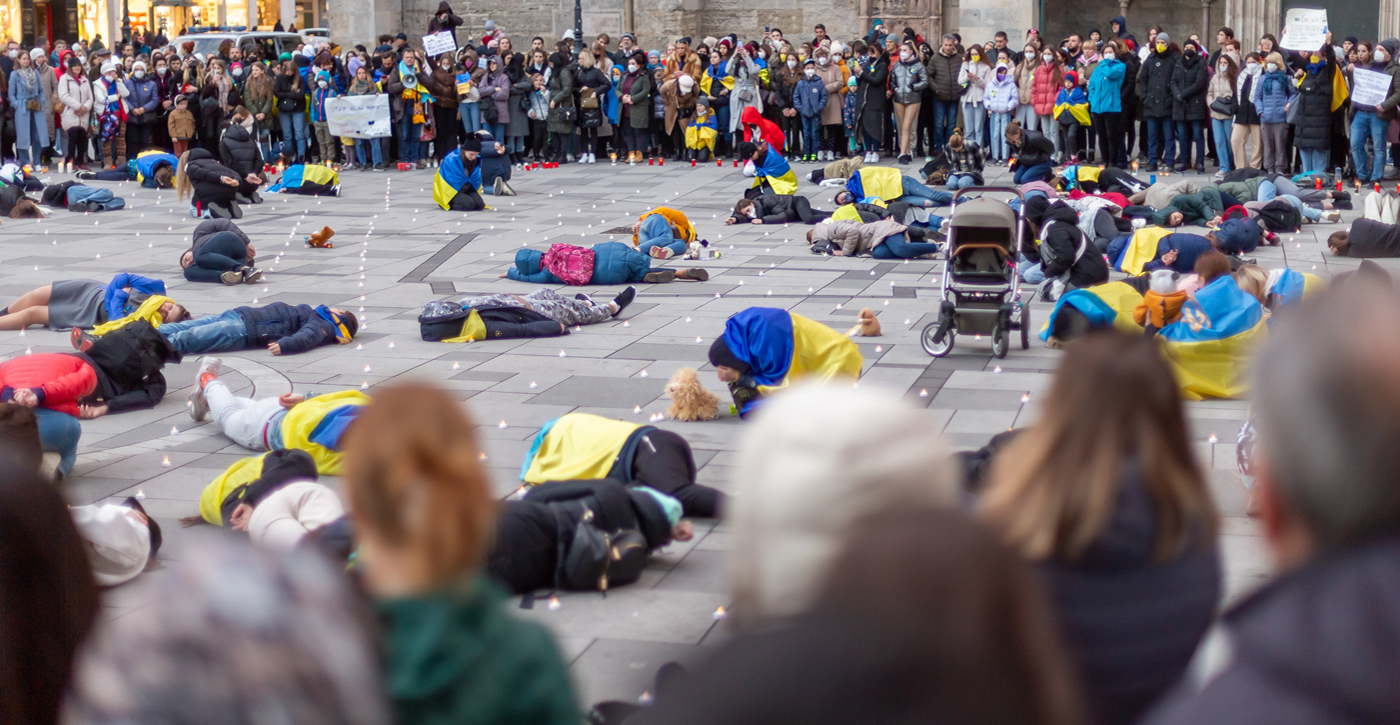
The very big problem that Americans have is that US foreign policy is driven by a small group of unelected officials who are committed to US world economic and political domination. Since WWII it is that group that has instigated numerous wars and political upheavals all over the planet. The propaganda is as Patience describes. And war deaths perpetuate war because we cannot allow war deaths to be “in vain”. And now the US is literally under the control of the all-powerful “military industrial complex” that requires those military engagements and compensates Congressmembers out of the funds they legislate for “defense” in a corrupt feedback loop. The war in Ukraine is widely misreported by US media. As retired Col. Richard Black explains, “The decision for war was made in Washington; the decision to invade was made in Moscow.” Advocates for peace in Ukraine need to be pressuring the President and Congress to stop pushing war in Ukraine and facilitate an end to the hostilities. Another serious challenge before us is Washington’s interest in provoking war between Taiwan and the rest of China. The actions of the small group of irrational policy dictators in Washington are a very real existential threat to humanity. The first challenge is to become fully informed of the facts, and the second is to dramatically increase the demands and moral force for ending US aggression around the world.
This is an excellent article. Quakers need to oppose this war in Ukraine that the U.S. is largely financing with lethal weapons just as they have opposed wars in the past. The media are so biased that everyone including former peace people seem to have been taken in. This is a fight with international repercussions and the devastation of one whole country and its people over the right to join NATO. Putin has a right to be threatened by NATO and the military arms that were provided by NATO and the U.S. so close to Russian territory. Biden did not engage in diplomacy to prevent the war but instead pushed Putin’s buttons with threats. Putin is a psychopath who showed that as a young officer stationed in East Germany where people were killed if they tried to leave the country. Dealing with such a man is very difficult, but risking nuclear war or a nuclear accident and the deaths of hundreds of thousands so NATO can grow stronger makes little sense. In the end, Zelenski will have to make the same settlement he could have made at the beginning. This is a lose/lose situation. If Quakers don’t protest what is going on, who will?
Most Americans have no clue of the history behind Ukraine war. They think it started now, rather than 8 years ago with Ukraine shelling cities in the Donbass which did not accept US backed coup. Prof. John Mearsheimer lays out the background. https://zeitgeistcontext.wordpress.com/2022/04/04/ukraine-debacle-timeline/
What if it were happening to us? What if nearly 12 million of us were displaced by the war, what if a nuclear power plant was being shelled, what if war crimes were happening in our neighborhoods? What would we say then?
I am overwhelmed by the heartfelt response for our Peace Testimony. My grandfather grew up in Haverford MM. I attended Media/Springfield Preparative Meeting of Chester MM (Orthodox). “Thee should not entertain thoughts of entering the Armed Forces.”
Fall, 1953 just after the Korean armistice. “Read this tract by Jonathon Dymond.”
I could not have a capgun to play cowboys and Indians, because the Indians are our friends. Same with war toys – War is not a game.
Media Elders: “If thee ever has a problem due to practicing the Peace Testimony, call on us.”
Fast forward. July 1, 1967 I marry my wife of 55 years. Her Dad: “Marilyn, you are marrying a Quaker. Quakers have problems with authority.”
Reality: I begin PhD studies at Pitt Graduate School of Chemistry in Sept. First week of October I meet the Chairman of the Dept.
I have heard rumors you are a Quaker.
“yes” I said.
Did you register as a conscientious objector. “yes”
You are expelled effective at the end of the year. No who one who will not fight for his country will get a PhD in my Dept.
I asked support from the elders of the Pittsburgh Meeting – “There is nothing we can do because CO to war is not a constitutional right.”
The Media elders were dead. I turned in my deferment and refused induction. Pending prosecution (1-A Delinquent) for years. Others suffered far more. Won a scholarship to Pitt Law School. Classified 1-0 at age 27 on orders from Asst. AG Thornburg.
Thank you for sharing your story. There have been many COs. They–you–faced real recrimination, loss and prison. I think your action mattered. I am sorry the world was not ready for our–your–answer. I think it was brave then and now.